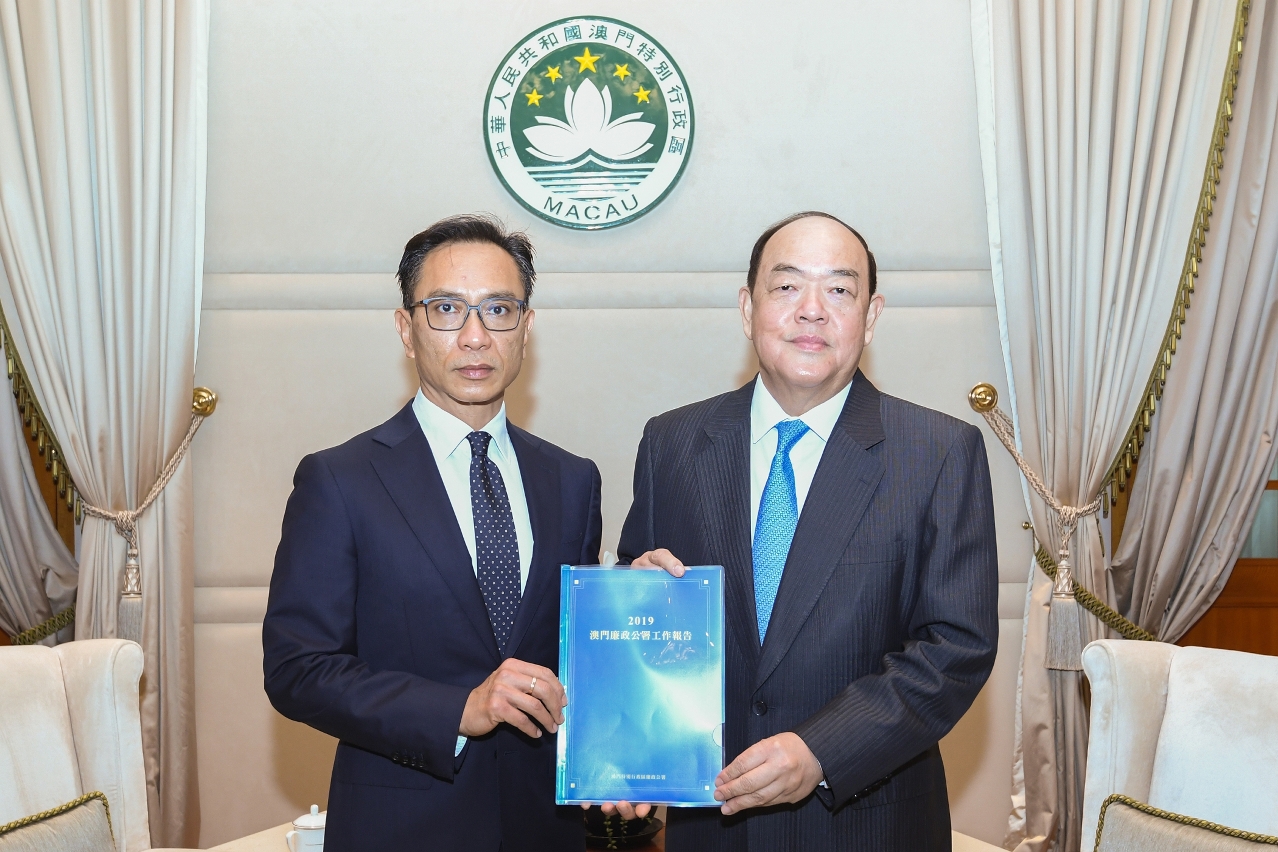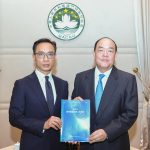 The Commissioner Against Corruption, Chan Tsz King, submitting the 2019 Annual Report of the CCAC of Macao to the Chief Executive, Ho Iat Seng
The Commissioner Against Corruption, Chan Tsz King, submitting the 2019 Annual Report of the CCAC of Macao to the Chief Executive, Ho Iat Seng
The 2019 Annual Report of the Commission Against Corruption of Macao was published in the Official Gazette of the Macao Special Administrative Region today (20th May). The report reviews the anti-corruption work carried out in 2019, including the crackdown on the corruption case where some leaders and chiefs of the Macao Trade and Investment Promotion Institute allegedly abused their powers for illicit gain and received bribes to perform illicit acts in the process of vetting and approving the applications for “major investment immigration” and “technical immigration” as well as many cases involving fraud over various kinds of government subsidies. The CCAC found that there was a decrease in the types of crime recorded last year. Document forgery cases took up a large portion of the investigated cases, while there was a decrease in the number of cases involving active and passive bribery. However, with regard to disciplinary offences and illegal acts committed by civil servants, there was a slight increase in the number of cases committed by police, mainly including their unauthorised entry into casinos and frauds.
Last year the CCAC completed several inquiries in the area of ombudsmanship, including “Investigation of officials recommending employment of relatives by Office of the Prosecutor General”, “Investigation of the parcel at Colina da Ilha Verde”, “Investigation of employment of translators/interpreters from the Chinese Mainland by the Supporting Office to the Forum for Economic and Trade Co-operation between China and Portuguese-speaking Countries”, and “Investigation of report against Director of Policy Research and Regional Development Bureau”. The CCAC considers that in the said inquiries, although the matters being investigated and the analysis and conclusions differed from each other, they all revealed various kinds of failure of the public departments to fully comply with the law and have a satisfactory solution when dealing with the issues, which shall be made an example of all public departments.
In the “Foreword” of the report, the Commissioner Against Corruption points out that in 2019, apart from carrying out investigations into corruption cases in the public sector, the CCAC also attached importance to anti-corruption work targeting at the private sector. It also noticed that among the complaints involving private companies in recent years, there has been a growing trend in the complaints and reports about the management of gaming companies and large hotels, which mainly involved irregular acts in the processes of construction project tendering, procurement of goods and recruitment and promotion of personnel. The CCAC will continue to keep a close eye on the risk of bribery in the private sector which possibly arises from such problems, strive to enhance the integrity management and healthy development of private companies and safeguard the integrity and fairness of society.
Meanwhile, regarding the fact that some citizens would rather resolve civil disputes by reporting them to the CCAC as crimes, such as disputes involving expenditure of administration fees by the management company and the management committee of a building, the CCAC considers that it is necessary to instil correct knowledge of dispute resolution into citizens through publicity and education in the future in order to ensure that the whole social system operates in the right way.
Of the ombudsman cases investigated, a majority involved issues which were not so serious as violation of law. In fact, it was more common to see that the problems occurred when the public departments executed abstract provisions and that there was still room for improvement of the efficiency of solving citizens’ problems in an empathic way.
In 2019, the CCAC received a total of 584 complaints and reports. 111 and 473 cases were filed for investigation by the Anti-Corruption Bureau and the Ombudsman Bureau respectively. It also points out that 319 complaints and reports lodged by the residents were anonymous, of which over 66% were groundless, did not jibe with the facts or could not be followed up for useful finding. This is undoubtedly a kind of abuse of public resources. The CCAC hopes that citizens will lodge complaints or reports with basis when they exercise their rights and fulfil their obligations in order to jointly contribute to the building of a cleaner and fairer society.
The CCAC stresses that whether the complaints are filed anonymously or not, it follows them up with the same attitude and never neglects any of them due to anonymity. Nevertheless, following in-depth investigation, the CCAC has found that some of the anonymous reports were not truthful and even there were signs showing that some people attempted to smear others by filing these reports. In this case, the CCAC will deploy a specific approach in order to prevent abuse of the reporting mechanism. Meanwhile, it will strengthen the relevant promotion through various channels in order to guide citizens to use the reporting mechanism correctly.
Having been submitted to the Chief Executive, Ho Iat Seng, in accordance with the Organic Law of the Commission Against Corruption of the Macao Special Administrative Region, the Annual Report summarises the CCAC’s work in such areas as anti-corruption, ombudsmanship, promotion and education, exchange and training. It also includes summaries of some of the criminal cases and administrative complaints investigated or handled by the CCAC. The full text of the Annual Report can be viewed on the Official Gazette of the Macao Special Administrative Region or downloaded from the CCAC’s website.


